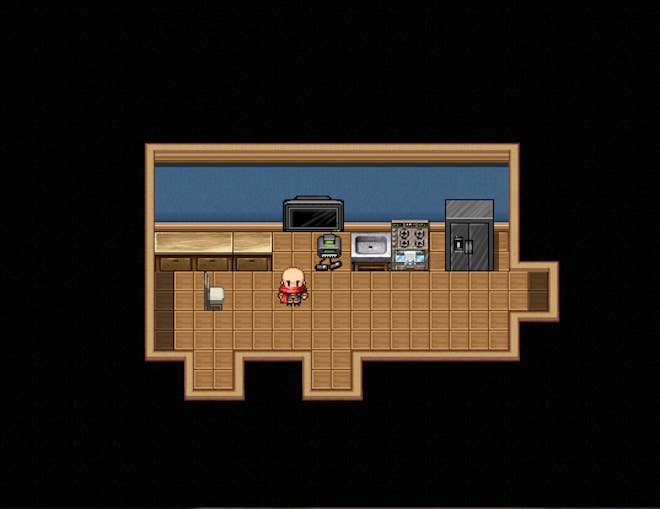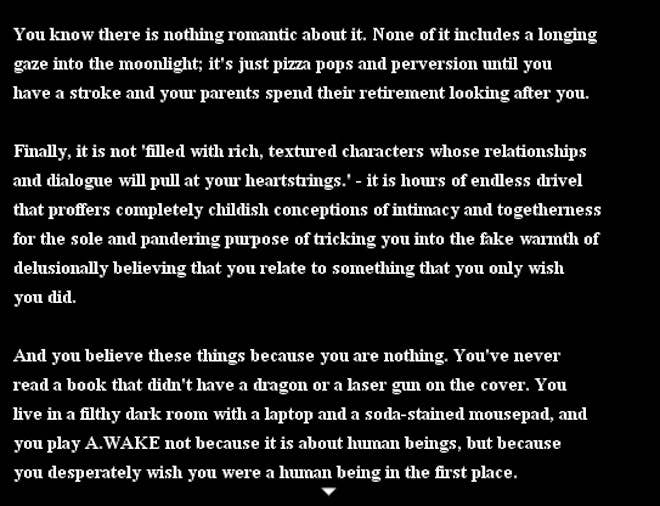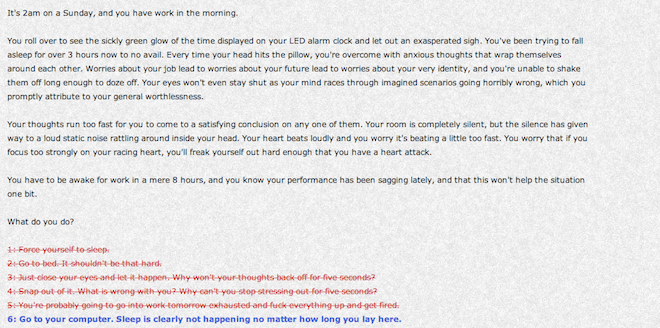
Video games are power fantasies. The reason that most popular game genres — the shooter, the action-adventure, the role-playing game — involve ubermensch-ian acts of strength and accomplishment, the argument goes, is that many of the people who play them are young and frustrated males who crave agency and influence and can only get it through make-believe. Games are an escape from depressing circumstances.
Whatever you think of this theory, it is a fact that gamers tend toward depression. Although the relationship between games and depression is complicated (do depressed people self-medicate with games, do games depress people prone to it, or is it a more complex feedback relationship?), study after study has confirmed that it exists.
So it's significant that the hero of one of a pair of new independent games about depression, Actual Sunlight, is a gamer. The character, Evan Winter, is a fat, isolated, self-hating corporate drone who tries to distract himself from a nearly suicidal depression through games and booze. The other game, a choose-your-own-text adventure with the ironic title Depression Quest, involves a protagonist who spends his sleepless nights plumbing the depths of the internet. These are young men with no social support and no hope, the anomic detritus of lives lived on keyboards, Bowling Alone taken to the fatal extreme.
Actual Sunlight (by Will O'Neill) and Depression Quest (by Zoe Quinn, Patrick Lindsey and Isaac Shankler) are the most sustained depictions of depression in the history of gaming, and they are both wearying experiences. To complete either game, you have to trudge through thousands of words about feelings of worthlessness, anxiety, despair, anger, and fear.
In Actual Sunlight, that takes the form of Evan's diary entries:

In Depression Quest, you read and respond to a series of mundane vignettes:

The rewards in these games are either nonexistent or minimal (in Depression Quest, if you start going to a Cognitive Behavioral therapist, more options open up at the end of each vignette). The prize for progression in is mostly more hopeless text. Both games have mostly stripped away the presentation that makes gaming pleasant. Visuals are either spare or absent. Music is limited. It's enough to make you want to stop playing, and that is surely by design, meant to echo the feelings of resignation and exhaustion common to clinical depression.
But these games aren't just catalogs of depressive cognition. What makes them interesting, and differentiates them from novels or films about depression, is that they build the very powerlessness of the disease into the structure of play. Notably, they invert the normal arc of a narrative game. Instead of incrementally increasing the player's power over time, Actual Sunlight and Depression Quest (if you make certain choices) actively reduce your ability to affect the game world. By the end of Actual Sunlight, you have literally no choice but to take Evan to the roof to commit suicide. That's how you "win" the game, by becoming totally powerless. If the narrative of almost every game is triumph, the narrative of these two games is, basically, defeat.
Playing these games, particularly Actual Sunlight, which juxtaposes the horror of a severe depression with a lighthearted aesthetic (it looks and sounds like a Super Nintendo role-playing game), I was reminded of a passage from William Styron's classic memoir of depression, Darkness Visible:
A phenomenon that a number of people have noted while in deep depression is the sense of being accompanied by a second self — a wraithlike observer who, not sharing the dementia of his double, is able to watch with dispassionate curiosity as his companion struggles against the oncoming disaster, or decides to embrace it. There is a theatrical quality about all this, and during the next several days, as I went about stolidly preparing for extinction, I couldn't shake off a sense of melodrama — a melodrama in which I, the victim-to-be of self-murder, was both the solitary actor and lone member of the audience.
That's just the thing that is so fascinating about Actual Sunlight and Depression Quest. They turn the player into that "wraithlike observer," aware of the stakes of the drama, curious about its resolution but incapable of shaping it. Games might make us feel empowered, we are being told, but they are also a way of putting our lives at a distance, a way of forgetting that we always have the power to change the real world.
